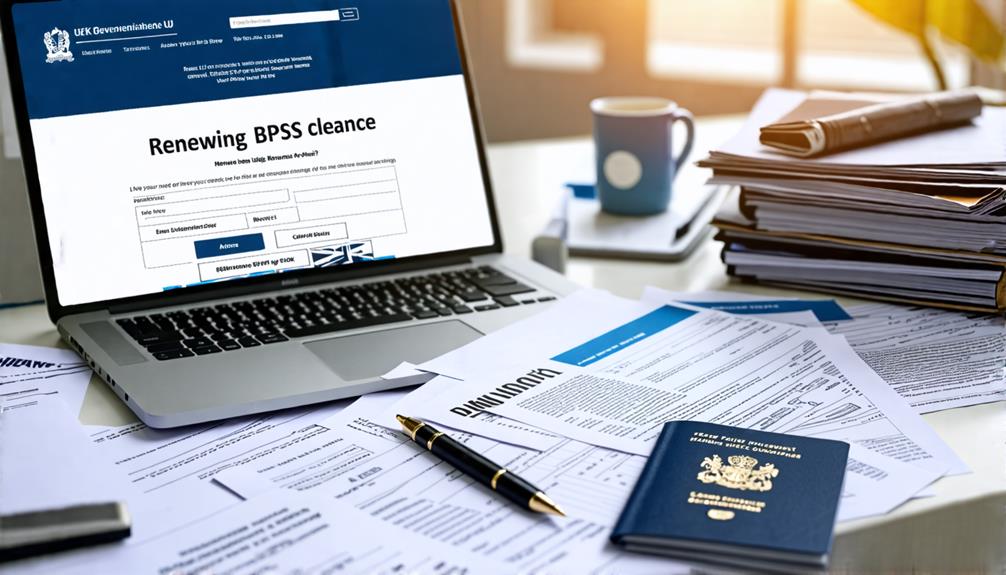The process of renewing your BPSS clearance in the UK requires reevaluation of your work eligibility, validation of your identity using official documents like passports, and a look into your employment history for the past three years.
It is mandatory for civil servants, migrant workers, and government contractors to keep their clearance valid with regular rechecks, which are typically determined by organizational policies and any significant changes in their situation, such as long stays abroad.
Necessary documents include proof of work eligibility, identity, and an up-to-date employment record.
Adequate preparation can help avoid delays and issues related to compliance.
For a comprehensive step-by-step guide, seek additional information.
Understanding BPSS Clearance
Understanding BPSS Clearance involves a deep understanding of its four key checks: Right to Work verification, identity verification, criminal record checks, and employment history checks for the last three years.
BPSS, which stands for Baseline Personnel Security Standard, is a pre-employment screening requirement in the UK for individuals who will have access to government assets.
The Right to Work verification check confirms that the individual is legally allowed to work in the UK.
The identity verification check involves the confirmation of the candidate’s identity using official documents like passports or national ID cards.
Criminal record checks are carried out to find out if the individual has any past convictions that could be a security risk.
Lastly, employment history checks look at the candidate’s employment for the past three years to find any inconsistencies or gaps that may need more investigation.
These checks are necessary for roles that involve access to government information, such as civil servants, armed forces members, contractors, and temporary staff.
Compliance with GDPR during the BPSS screening process is required to ensure that personal data is handled securely and responsibly.
While BPSS checks don’t have an expiration date, ongoing security management may require periodic rechecks, especially concerning the right to work status.
Who Needs BPSS Renewal
Those who need BPSS renewal usually encompass migrant workers, civil servants, members of the armed forces, temporary staff, and government contractors. BPSS checks act as a fundamental security step for individuals who have access to sensitive government resources. Although these checks do not have an official expiry date, certain situations demand regular rechecks to maintain adherence to regulations and workplace safety.
Migrant workers need to renew their BPSS on an annual basis in order to comply with right to work rules. This ensures their legal status to work in the UK is continually verified. Civil servants, armed forces members, and government contractors also fall under the scope of BPSS renewals. Organizational policies specific to their roles and changes in circumstances, such as gaps in employment or long periods spent overseas, can trigger the need for rechecks.
Temporary staff, due to the fluctuating nature of their roles, often need regular BPSS renewals in line with changing security procedures. It is the responsibility of employers to keep track of the BPSS clearance status of their employees, ensuring timely completion of any necessary rechecks. This anticipatory approach is crucial in avoiding any lapses that could affect an individual’s ability to work and the overall security structure of the workplace.
Keeping BPSS clearance current is critical for meeting government standards and protecting sensitive data.
Steps to Renew BPSS
To renew BPSS clearance, employers are required to commence with an examination of the individual’s right to work status and updating necessary identification validation details. This initial move is critical for upholding immigration laws and confirming that all identification documents are up-to-date and legitimate.
Next, employers are expected to carry out an exhaustive review of the individual’s work history. This encompasses confirming that any career breaks or long durations spent overseas are transparent and suitably checked. This is a key step to uphold the integrity of the BPSS clearance and confirm that there have been no substantial alterations that could influence the individual’s aptness for the role.
Documentation Required
For a successful renewal of BPSS clearance, it is of great importance that you provide specific and correct documentation.
Starting with the verification of your Right to Work status in the UK, you will need to present either a passport or a visa. This will confirm your legal authorization to work.
Your identity can be confirmed by submitting a government-issued ID, like a driver’s license or passport, along with proof of address. Suitable proof of address can be recent utility bills or bank statements. This dual-check method ensures the precise confirmation of your identity and place of residence.
You must also provide an updated employment history for the past three years. This should include all employment details, accounting for any significant gaps or long durations spent abroad. Precise employment records are key to uphold the BPSS clearance process.
A Standard DBS check may also be needed to recheck any unspent criminal records. This additional check confirms that you continue to align with the security standards of BPSS.
Common Renewal Challenges
Navigating the process of BPSS clearance renewal often presents several difficulties, especially for migrant workers and their employers who must grapple with constantly changing regulations. A significant challenge lies in the obligation for migrant workers to renew their BPSS checks every year. This requirement can make it difficult to comply with immigration and employment rules, potentially leading to delays and additional administrative tasks.
The paperwork necessary for BPSS renewal can also be extensive. Both employers and employees frequently need to provide updated employment records and details of any prolonged periods spent overseas. This can become a daunting task for those with intricate employment histories or those who travel internationally on a regular basis. It is critical that all required paperwork is prepared well in advance to prevent any delays, given that the completion of BPSS checks generally takes between 5 to 10 working days.
It is also incumbent on employers to keep up with any changes in BPSS regulations or requirements. Non-compliance could lead to security risks and could also have legal and operational consequences. Being well-informed and proactive in understanding regulatory changes is critical to ensure seamless renewals and to maintain organizational security.
Efficiently tackling these common challenges helps to uphold the integrity and continuity of BPSS clearance within the organization.
Conclusion
Renewing BPSS clearance in the UK requires a comprehensive understanding of its standards, the identification of personnel in need of renewal, and following the established procedures and necessary paperwork.
Being aware of potential obstacles can help ease the renewal process.
Adhering to these aspects is critical for upholding the credibility and reliability of individuals in sensitive roles.
Compliance with these guidelines ensures the ongoing safety and effectiveness of operations in the relevant sectors.



